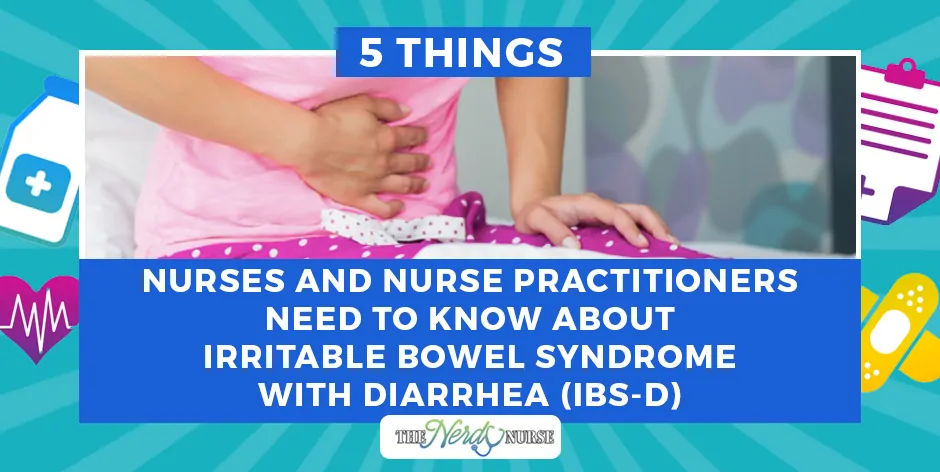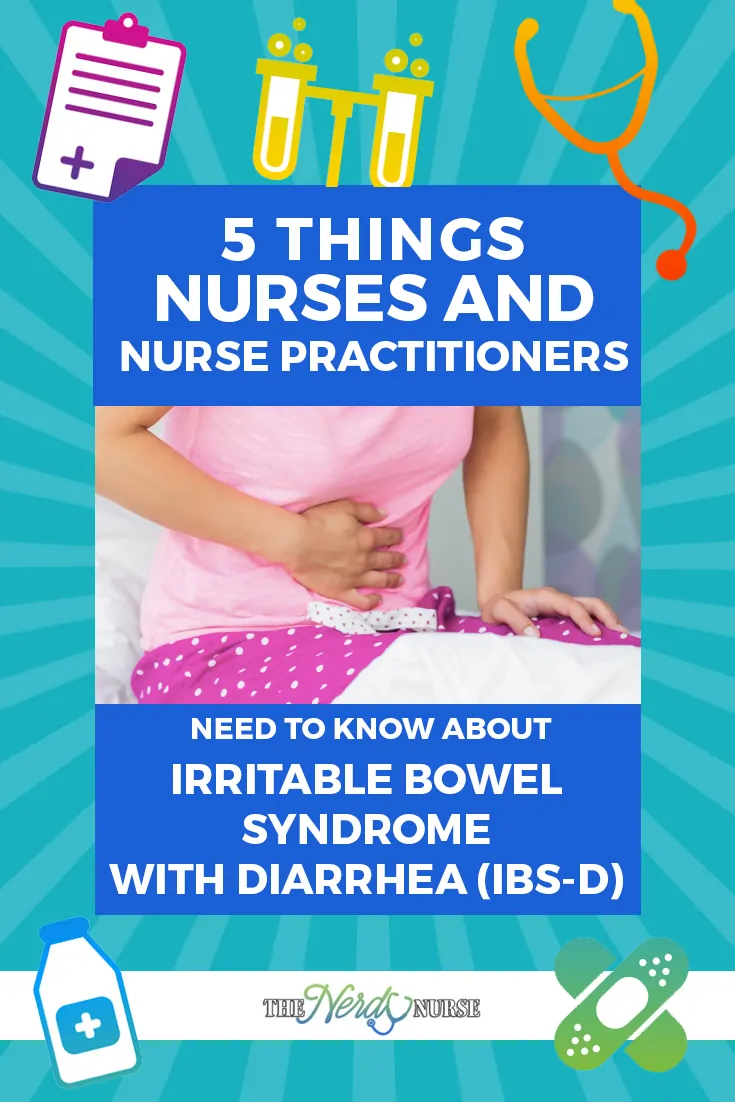Thank you to Salix Pharmaceuticals for sponsoring this post.
The contents of this article are not medical advice and should not be deemed as such.
Irritable Bowel Syndrom (IBS) is a common disorder of the large intestine. IBS that causes increased diarrhea is often called IBS-D. Recently, I had an opportunity to learn more about the disease state and discovered many surprising facts. I’ve also collected a few strategies that nurses, nurse practitioners, and physicians can use to ensure patients afflicted with this syndrome can receive proper care and treatment.
IBS, IBS-D Affects Millions of People
Pinpointing the exact number of patients affected by IBS-D is difficult, but we can all agree a lot of people are impacted. Evidence suggests that more than 16 million patients (primarily women) in the US suffer from IBS. Research supports that as many as 48 million people in the United States could be affected by IBS.
IBS, IBS-D Often Goes Undiagnosed
Since IBS doesn’t show up with standard diagnostic tests like colonoscopy, it’s often a diagnosis that is overlooked or missed. In fact, up to 75% of individuals affected with IBS go undiagnosed. The reason for the lack of diagnosis in many patients with this condition remains unclear, as it is likely multi-factorial. Those factors include:
- Many have not been medically diagnosed with IBS
- The range of reported symptoms
- A greater diagnostic challenge than other GI symptoms
IBS-D Impacts Quality of Life
It’s not surprising that any disorder involving diarrhea or GI disorders, in general, would be a subject that would be embarrassing to many. The fact is that discussions involving poop or bathroom activities tends to be taboo amongst most people. Nurses are a rare breed who seem to be immune to this type of bodily fluid discomfort. Even so, we tend to be less comfortable talking about our personal bowel habits and issues.
But as I learned from the patients I met at a recent Salix Pharmaceuticals-sponsored event, IBS-D had, at one point, affected nearly every aspect of their lives. One patient described the anxiety and stress related to having to know every bathroom along the way of her 1-hour commute to the office. Another patient spoke about how the struggle to continually think about the food she ate and the potential of her bowel to surprise her and ruin her plans. They reported having to change or cancel plans or even pre-medicate with antidiarrheal agents before planned events.
The patients I met are sharing more of their stories and struggles in an Access Health IBS-D segment, which also appears on the Lifetime Channel.
Hopeless and exhausting seemed to succinctly summarize their feelings around IBS-D.
Common Symptoms of IBS-D
According to an article in the American Journal of Gastroenterology, symptoms of Irritable Bowel Syndrome with Diarrhea include:
- “Chronic or recurrent abdominal pain that is associated with altered bowel function”
- “Pain related to defecation, changes in stool frequency or appearance”
- Straining
- Fecal urgency
- Bloating
IBS-D specifically has a prominence of diarrhea.
The ROME IV criteria for IBS diagnosis are:
Recurrent abdominal pain on average at least 1 day/week in the last 3 months, associated with 2 or more of the following criteria:
- Related to defecation
- Associated with a change in the frequency of stool
- Associated with a change in the form (appearance) of stool
Primary Care Has a Huge Role to Play
People don’t want to talk about their bowels, even with health care providers. In a recent survey, 55% of diagnosed IBS-D patients reported symptoms that lasted 10 years (or more).
Nurse Practitioners, physicians, and nurses alike have a big role to play in educating patients on normal bowel routines. A few extra seconds providing clarity around normal digestive function and the normal frequency and form of defection could be enough to help certain patients realize that their bowel habits aren’t normal. As long as patients do not report alarm features (including, but not limited to, weight loss, rectal bleeding, anemia, family history), primary care providers can typically diagnose IBS-D without the need for GI referral.
Individualized Care and Treatment for IBS-D is a Must
IBS-D symptoms are thought to be caused by several different factors including intestinal contractions, food sensitivity, and changes in intestinal bacteria. To alleviate symptoms, some patients try the introduction of low FODMAP diets or over the counter medicine. Others may benefit from pharmaceutical interventions, such as Xifaxan® (rifaximin).
Important Safety Information XIFAXAN
550mg Tablets
INDICATION
XIFAXAN® (rifaximin) 550 mg tablets are indicated for the treatment of irritable bowel syndrome with diarrhea (IBS-D) in adults.
IMPORTANT SAFETY INFORMATION
- XIFAXAN is not for everyone. Do not take XIFAXAN if you have a known hypersensitivity to rifaximin, any of the rifamycin antimicrobial agents, or any of the components in XIFAXAN.
- If you take antibiotics, like XIFAXAN, there is a chance you could experience diarrhea caused by an overgrowth of bacteria (C. difficile). This can cause symptoms ranging in severity from mild diarrhea to life-threatening colitis. Contact your healthcare provider if your diarrhea does not improve or worsens.
- Talk to your healthcare provider before taking XIFAXAN if you have severe hepatic (liver) impairment as this may cause increased effects of the medicine.
- Tell your healthcare provider if you are taking drugs called P-glycoprotein inhibitors (such as cyclosporine) because using these drugs with XIFAXAN may lead to an increase in the amount of XIFAXAN absorbed by your body.
- If you are pregnant, planning to become pregnant, or nursing, talk to your healthcare provider before taking XIFAXAN because XIFAXAN may cause harm to an unborn baby or nursing infant.
- In clinical studies, the most common side effects of XIFAXAN in IBS-D were nausea (feeling sick to your stomach) and an increase in liver enzymes.
You are encouraged to report negative side effects of prescription drugs to the FDA. Visit http://www.fda.gov/medwatch or call 1-800-FDA-1088.
For product information, adverse event reports, and product complaint reports, please contact: Salix Product Information Call Center
Phone: 1-800-321-4576
Fax: 1-510-595-8183
Email: mailto:[email protected]
Please click here for full Prescribing Information.
XIFI.0349.USA.17





